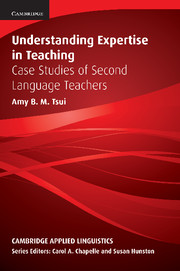Book contents
- Frontmatter
- Contents
- Series Editors' Preface
- Acknowledgments
- Chapter 1 Introduction
- Chapter 2 Conceptions of Expertise
- Chapter 3 Characteristics of Expert and Novice Teachers
- Chapter 4 Teacher Knowledge
- Chapter 5 The Case Studies
- Chapter 6 The Professional Development of the ESL Teachers
- Chapter 7 Teacher Knowledge and Managing the Classroom for ESL Learning
- Chapter 8 Teacher Knowledge and the Enactment of the ESL Curriculum
- Chapter 9 Taking on the Challenge: Exploring Process Writing
- Chapter 10 Understanding Expertise in Teaching
- Appendix 1 Reader's Comment Form on First Draft for the Second Writing Task (Angel's First Draft)
- Appendix 2 Learner Training in Making Revisions
- References
- Index
Chapter 9 - Taking on the Challenge: Exploring Process Writing
Published online by Cambridge University Press: 05 October 2012
- Frontmatter
- Contents
- Series Editors' Preface
- Acknowledgments
- Chapter 1 Introduction
- Chapter 2 Conceptions of Expertise
- Chapter 3 Characteristics of Expert and Novice Teachers
- Chapter 4 Teacher Knowledge
- Chapter 5 The Case Studies
- Chapter 6 The Professional Development of the ESL Teachers
- Chapter 7 Teacher Knowledge and Managing the Classroom for ESL Learning
- Chapter 8 Teacher Knowledge and the Enactment of the ESL Curriculum
- Chapter 9 Taking on the Challenge: Exploring Process Writing
- Chapter 10 Understanding Expertise in Teaching
- Appendix 1 Reader's Comment Form on First Draft for the Second Writing Task (Angel's First Draft)
- Appendix 2 Learner Training in Making Revisions
- References
- Index
Summary
In Chapter 6 we saw that although the four teachers' teaching experience is varied and they are at different stages of professional development, they are all faced with challenges constantly. The nature of the challenge, however, is different. Novice teachers are faced with challenges that are very basic to classroom teaching, such as maintaining order and discipline and establishing rapport with students. The challenges that expert teachers face, or rather, those that they choose to face, often involve extending their influence beyond their own classroom; in some cases, to the whole school and in other cases, even beyond their own school. In her first two years when Marina took on the role of the chair of the English panel, she went beyond her own classroom and started to involve the teachers on the panel in experimenting with new ways of teaching, such as the introduction of phonetics in the teaching of pronunciation and the setting of objectives for each unit in the scheme of work. According to Marina, those were small scale changes. In her eighth year of teaching, she embarked on a much larger scale change in the teaching of writing. It is an area with which she is least satisfied and least confident. In this chapter we shall see how Marina rose to the challenge.
From Product Writing to Process Writing
For a long time at St. Peter's, teachers had been using the product approach in the teaching of writing, as in most schools in Hong Kong.
- Type
- Chapter
- Information
- Understanding Expertise in TeachingCase Studies of Second Language Teachers, pp. 225 - 244Publisher: Cambridge University PressPrint publication year: 2003

